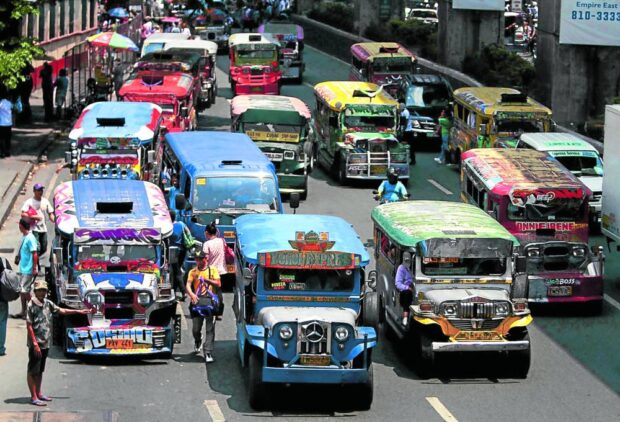DOTr reiterate importance of franchise consolidation in PUV modernization

FILE PHOTO: In this 2017 photo, traditional jeepneys ply along Aurora Boulevard in Cubao, Quezon City. Philippine Daily Inquirer/ Richard A. Reyes
MANILA, Philippines — The Department of Transportation (DOTr) has doubled down on the importance of franchise consolidation in modernizing Public Utility Vehicles (PUV) in the country.
In a post on social media, DOTr Chief Jaime Bautista stressed that consolidation ensures the operation of PUVs would be efficient.
“It’s important to consolidate now because the operations [land transportation] need to be efficient. If we don’t consolidate, we will continue to operate the way we do—each on our own, fighting on the streets, without proper standards for operation and safety,” Bautista said in Filipino.
“Kung kanya-kanya ang operations, hindi maaayos yan,” he continued.
(If the operations are independent, it won’t be orderly.)
He likewise vowed the DOTr and its attached agencies would ensure the effectiveness of the PUV modernization program’s (PUVMP) implementation.
“We will make the PUVMP effective,” the DOTr Chief said on Saturday.
Bautista’s statement comes a week after the December 31 deadline for franchise consolidation, signaling the start of PUVMP’s implementation.
READ: Noncompliant PUVs: We’ll stay on road until barred
Franchise consolidation as part of the government’s PUVMP mandates operators to surrender their individual franchises into a single cooperative or corporation operating on one specific route.
PUV operators who failed to consolidate prior to December 31 last year would no longer be allowed to form or join cooperatives, the Land Transportation Franchising and Regulatory Board (LTFRB) has said.
But a few days before the deadline, the LTFRB released a directive which allowed non-consolidated PUVs to ferry commuters until January 31 along routes which did not reach a 60-percent consolidation rate.
READ: LTFRB: ‘Unconsolidated’ PUVs allowed until Jan. 31
According to the LTFRB, the PUVMP seeks to upgrade the country’s public transportation as it will replace traditional jeepney units with modern ones which are fitted with more environment-friendly engines, CCTVs, and an automated fare collection system, among other upgrades.